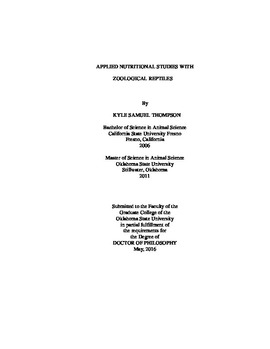| dc.description.abstract | The first clinical case evaluated the body condition estimates of Brothers Island Tuatara (Sphenodon guntheri) housed at the San Diego Zoo to that of the wild. The tuataras that are cared for by the San Diego Zoo (SDZ) are larger and have a greater conditioning score than that of the tuataras sampled in the wild. Over the 9 year period of sampling the SDZ tuatara had a mean increase in mass of 125.2 %, SVL of 31.7 %, and BCE of 7.5%. The second clinical case evaluated ascorbic acid, vitamin E, vitamin A, and trace elements in serum of zoo crocodilians. For the 20 individuals from four species (Alligator mississippiensis; Alligator sinensis; Crococdylus johnsoni; and Gavialis gangeticus), serum nutrient concentrations averaged 11.06 mg Ca/dl, 91.66 mg Cu/dl, 36.88 mg Fe/dl, 2.86 mg Mg/dl, 4.03 mg P/dl, 3.97 mEq K/L, 153.88 mEq Ma/L, 41.43 mg Zn/dl, 0.50 mg vitamin A/dl, 46.70 mg vitamin E/dl, and 0.66 mg ascorbic acid/dl. The third study evaluated the nutrient composition of banana tree (Musa sp.) leaf, petiole, and pseudostem at the San Diego Zoo. In a zoo environment, different banana tree components are commonly fed to various animals. At the San Diego Zoo, banana tree (Musa sp.) petiole and leaves are part of the gorillas' (Gorilla gorilla gorilla) browse rotation, and the pseudo-stem is fed once weekly to the Galapagos tortoises (Chelonoidis nigra). Knowing nutritional composition of different banana tree components can improve diet formulation for captive zoo animals. For this study, the length, weight, and nutritional composition of banana tree, leaves, petiole, and pseudo-stems was analyzed. The last study compared the estimated digestibility of two commercially-available herbivorous tortoise pellets versus historic San Diego Zoo Global diets. Trial 1 consisted of a series of digestibility trials on produce-based and commercial pelleted diets, using animals in the SDZG collection. Trial 2 examined the same range of information in a more controlled fashion by simulating the herbivorous tortoise's digestive system within a test tube. The results may be used to improve husbandry at zoos and to better educate pet owners on appropriate care of their companions. | |
